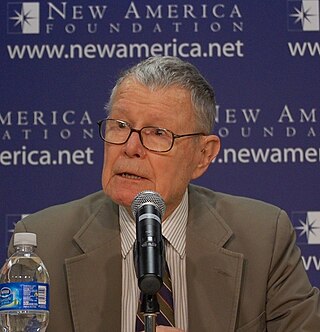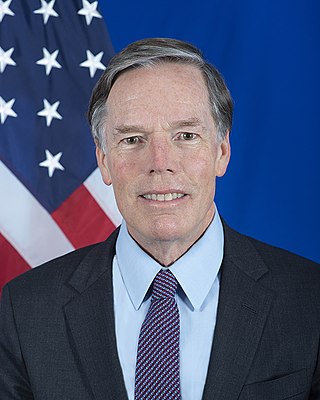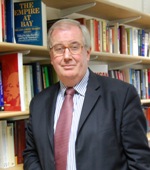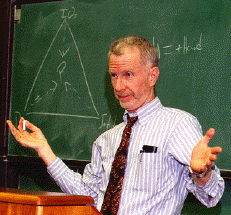
Joseph Samuel Nye Jr. is an American political scientist. He and Robert Keohane co-founded the international relations theory of neoliberalism, which they developed in their 1977 book Power and Interdependence. Together with Keohane, he developed the concepts of asymmetrical and complex interdependence. They also explored transnational relations and world politics in an edited volume in the 1970s. More recently, he pioneered the theory of soft power. His notion of "smart power" became popular with the use of this phrase by members of the Clinton Administration and the Obama Administration.

Thomas Crombie Schelling was an American economist and professor of foreign policy, national security, nuclear strategy, and arms control at the School of Public Policy at University of Maryland, College Park. He was also co-faculty at the New England Complex Systems Institute.

Ashton Baldwin Carter was an American government official and academic who served as the 25th United States secretary of defense from February 2015 to January 2017. He later served as director of the Belfer Center for Science & International Affairs at Harvard Kennedy School.

Graham Tillett Allison Jr. is an American political scientist and the Douglas Dillon Professor of Government at the John F. Kennedy School of Government at Harvard University. He is known for his contributions in the late 1960s and early 1970s to the bureaucratic analysis of decision making, especially during times of crisis. His book Remaking Foreign Policy: The Organizational Connection, co-written with Peter Szanton, was published in 1976 and influenced the foreign policy of the Carter administration. Since the 1970s, Allison has also been a leading analyst of U.S. national security and defense policy, with a special interest in nuclear weapons and terrorism.

Robert Nicholas Burns is an American diplomat and academic who has served as the United States ambassador to China since 2022.
Robert Jeffrey Art is Christian A. Herter Professor of International Relations at Brandeis University, and Fellow at MIT Center for International Studies. He subscribes to the theory of neorealism, which argues that force still underlies the power structure in the modern world. He is a member of the Council on Foreign Relations, a United States nonprofit think tank specializing in U.S. foreign policy and international affairs.

Thazha Varkey Paul is an Indo-Canadian political scientist. He is a James McGill professor of International Relations in the department of Political Science at McGill University. Paul specializes in International Relations, especially international security, regional security and South Asia. He served as the president of the International Studies Association (ISA) during 2016–2017, and served as the founding director of the McGill University – Université de Montreal Centre for International Peace and Security Studies (CIPSS).

Michael E. Cox is a British academic and international relations scholar. He is currently Emeritus Professor of International Relations at the London School of Economics (LSE) and Director of LSE IDEAS. He also teaches for the TRIUM Global Executive MBA Program, an alliance of NYU Stern and the London School of Economics and HEC School of Management.
Brenda Shaffer is an American scholar who holds positions as Fellow with the Atlantic Council and professor at University of Haifa. Shaffer was the former research director of the Caspian Studies Program at Harvard Kennedy School and past president of the Foreign Policy Section of the American Political Science Association. She specializes on energy in international relations and energy policy in the Caspian region and has written or edited several books of these topics, including "Energy Politics" and "Beyond the Resource Curse." Shaffer has also written a number of books on the topic of identity and culture in the Caucasus including explorations of Azeri literature and culture. She has been accused of lobbying for Azerbaijan and failing to disclose conflicts of interest. According to the 2019 book Lobbying in the European Union: Strategies, Dynamics and Trends, published by Springer: "research shows that her [Shaffer's] entire career has benefitted from financial support from sources tied to Azerbaijan's leadership".

The Robert and Renée Belfer Center for Science and International Affairs, also known as the Belfer Center, is a research center located at the Harvard Kennedy School at Harvard University in Cambridge, Massachusetts, in the United States.

Bruce Martin Russett was an American political scientist who was most well-known for his work on the democratic peace. He was Dean Acheson Professor of Political Science and Professor in International and Area Studies, MacMillan Center, Yale University, and edited the Journal of Conflict Resolution from 1972 to 2009.

Michael E. Brown is an American academic. He formerly served as Dean of the Elliott School of International Affairs of the George Washington University, where he currently serves as Professor of International Affairs, Political Science, and Gender Studies.

Jacek Kugler is a prominent American political scientist and scholar of International Relations. He is the former Chair of the Department of Politics and Policy at Claremont Graduate University in Claremont, California.
Harvey Brooks was an American physicist, "a pioneer in incorporating science into public policy", notable for helping to shape national science policies and who served on science advisory committees in the administrations of Presidents Dwight D. Eisenhower, John F. Kennedy, and Lyndon B. Johnson. Brooks was also notable for his contributions to the fundamental theory of semiconductors and the band structure of metals. Brooks was dean of the Division of Engineering and Applied Sciences of the Harvard University.
Dr. William H. Overholt is a senior research fellow at John F. Kennedy School of Government's Mossavar-Rahmani Center for Business and Government at Harvard University and principal of AsiaStrat LLC, a consulting firm.

The Thucydides Trap, or Thucydides' Trap, is a term popularized by American political scientist Graham T. Allison to describe an apparent tendency towards war when an emerging power threatens to displace an existing great power as a regional or international hegemon. The term exploded in popularity in 2015 and primarily applies to analysis of China–United States relations.
Stacy D. VanDeveer is an American academic and international relations scholar. He is Professor, Department of Conflict Resolution, Human Security, and Global Governance at the McCormack Graduate School at the University of Massachusetts, Boston. He was Chair of the Department of Political Science and Professor of Political Science at the University of New Hampshire. He has also taught courses with Harvard Extension School and Harvard Summer School, and been a fellow at Harvard University's John F. Kennedy School of Government, Brown University's Transatlantic Academy, UMASS, and UNH London Program. VanDeveer has authored and co-authored over 90 articles, book chapters, reports and six co-edited books on his specialties. His research interests include international relations, comparative politics, LGBT rights, EU and transatlantic politics, humanitarian degradation and connections between environmental and security issues.
Nawaf Essam Ahmad Obaid is a Saudi Arabian political scientist, and a former foreign policy & media advisor. He currently serves as the CEO of the Essam & Dalal OBAID Foundation (EDOF) in Geneva, a Commissioner at the Commission for International Justice and Accountability (CIJA) in The Hague, and a Visiting Senior Research Fellow at the Department of War Studies at King's College London.
Norrin M. Ripsman is a Canadian political scientist whose research mainly examines security, regional peacemaking, and neoclassical realism. Before 2016, he taught at Concordia University, Quebec, Canada. Since 2016, he has been Monroe J. Rathbone Professor in the International Relations Department at Lehigh University, Pennsylvania, US.











